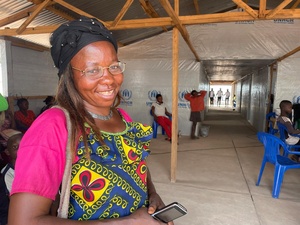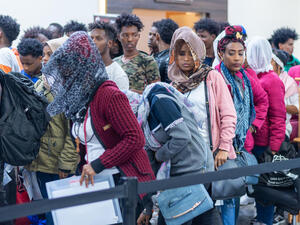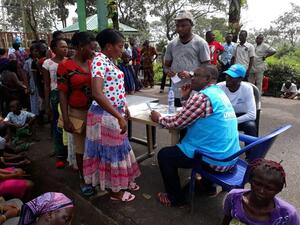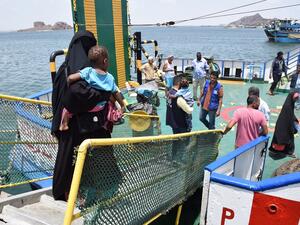UNHCR and partners in new initiatives to boost repatriation to Burundi
UNHCR and partners in new initiatives to boost repatriation to Burundi

A Burundian returnee collects her UNHCR cash grant at a transit centre in Ruyigi province.
MTABILA CAMP, Tanzania, July 12 (UNHCR) - The UN refugee agency and its partners are trying to encourage more Burundians to return home from camps in north-west Tanzania by offering such things as cash grants and a bigger food package.
The measures will help ease the initial reintegration of returnees. UNHCR plans to help up to 60,000 of the 150,000 Burundian refugees currently living in the Tanzanian camps to go back home by the end of this year.
Despite media reports that Tanzania plans to repatriate all 350,000 Burundian exiles on its territory this year, the government reiterated at a June meeting with UNHCR and Burundian officials that it would like to see more refugees returning home due to the improved security situation. It stressed that returns will be voluntary.
An important new initiative was the launch on Tuesday of a cash grant of 50,000 Burundian francs (US$50) to each returnee to help them get started once back in Burundi. The money will be paid through a network of local cooperatives and comes on top of other United Nations assistance such as repatriation transportation and basic household and farming items.
In another bid to further boost returnee figures, the World Food Programme in April started giving refugees food rations for four months compared to the previous three months. Meanwhile, the Burundian Commission on Land is establishing a presence in all provinces and aims to solve land and property conflicts, which often concern returnees.
UN agencies and non-governmental organizations are helping to restore infrastructure and services in Burundi to ease the reintegration process and make the country more attractive to refugees. NGOs providing secondary education in the camps in Tanzania have been encouraged to shift their programmes to areas of return in Burundi, where secondary school fees for returnees have been waived for two years.
"This sum, although not big, will help us sustain ourselves in those first days," said Larson Nyabenda at Mtabila camp. His compatriot Jean Hatungimana was less sanguine, noting that "50,000 francs is not the real problem - what is more crucial is peace and security."
But for 51-year-old Nestor Baranyitondeye, the money was a real incentive to go back. "We have been thinking about returning for a long time, but we were also concerned about the problems that returnees are facing in Burundi. The cash grants will help to overcome many of those," he told UNHCR staff at a camp in Kibondo, adding that he planned to use the money to buy some extra land when he got home.
Across the border at the Nyatibare transit centre in Ruyigi province, returnees queued on Wednesday to receive the first 10,000 francs instalment of the cash grant from UNHCR's implementing partner, COOPEC.
"This money will help us to rebuild our lives," said Isidore Sentamba, who was returning with his wife and six children after spending 15 years in Nduta camp in Tanzania. "I would have preferred all the money at once, so we could immediately start buying the things we need," he added.
"I will rent a piece of fertile land. I still have some land, but it is very small. Then I will buy some seeds, in addition to the seeds we already received here at the transit centre. I need seeds for beans, groundnuts and rice. Then we would like to buy some animals - some goats and chickens," Sentamba said.
"I am very thankful to UNHCR for this financial assistance," said another grateful returnee, Jean Ndimugwango. "This will not only allow us to rebuild our house which has been destroyed but also to buy new goats."
More than 4,700 Burundian refugees in Tanzania have returned home voluntarily with UNHCR help this year. Some 300,000 Burundian refugees have returned home since 2002, including 256,000 from Tanzania. More than 150,000 Burundian refugees currently live in camps in Tanzania, while another 200,000 who fled their homeland in the early 1970s live in three settlements.
Some of the UNHCR camps have been consolidated or closed in line with the falling camp population and to ensure an effective use of resources and better protection and assistance for the remaining refugees. There are now seven camps compared to 11 at the start of the year.








